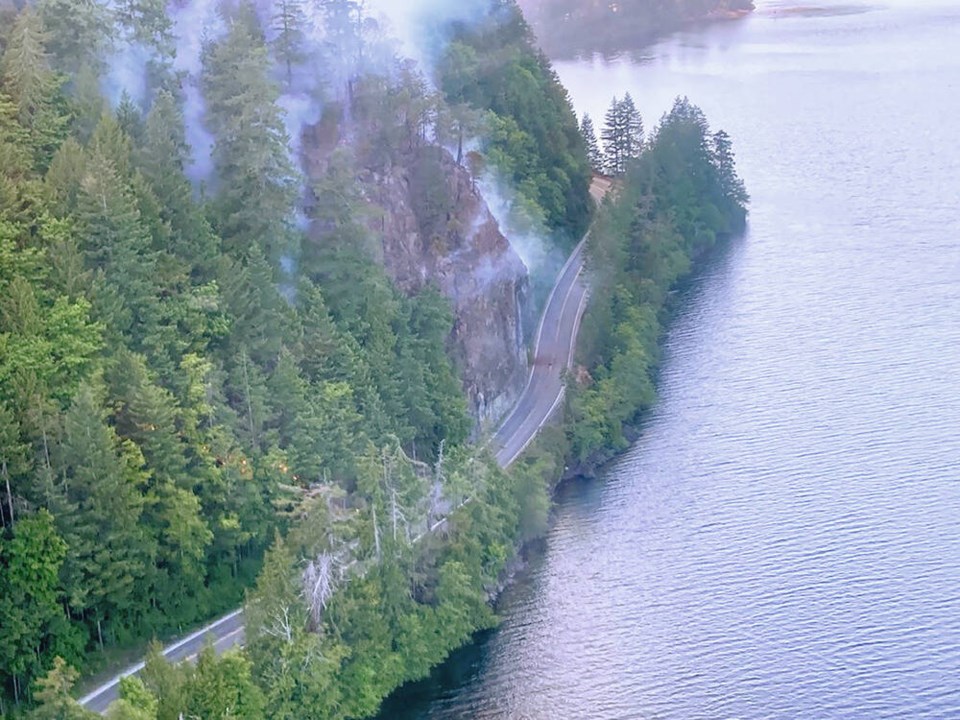Motorists planning to take a detour to avoid the Cameron Bluffs wildfire will face an hours-long delay on Friday when the rugged forest service road is closed between 1 p.m. and 9 p.m. to haul out a vehicle that went into Francis Lake.
Travellers are being asked to avoid the four-hour detour before, during and after the closure because commercial trucks will be queuing up to use it.
That will effectively cut off personal travel in and out of the west side of Vancouver Island for many hours. The detour has been used in recent days because Highway 4 is closed due to the out-of-control wildfire.
Road crews and environmental experts will be directing efforts to get the vehicle out of the lake.
If the work is completed quickly, the road will open sooner, the Ministry of Transportation said in a statement Thursday.
Police warned drivers to be cautious after a commercial vehicle left the road while on the route Wednesday adjacent to Francis Lake. The detour takes traffic from Port Alberni to Lake Cowichan via the Bamfield area using forest-service roads and privately owned industrial roads.
“Those roads are so windy and narrow,” said Island District RCMP Cpl. Alex Berube. “The dust and gravel can be slippery, and there can be clouds of dust that will reduce your visibility.”
Drivers are urged to fuel up, bring extra supplies, food and water and drive in daylight only.
Janelle Staite, deputy director of the south coast region for the Ministry of Transportation, said people should also be aware the route has no cellphone service or gas stations.
She said use of the detour has been fairly steady, with a mix of passenger and commercial vehicles. “We aren’t turning anyone away — we’re just really asking the public to be thoughtful around whether or not it’s critical to travel at this time.”
Only regular passenger vehicles like cars, vans and commercial vehicles weighing under 14,500 kilograms are allowed to use the route.
Staite said there have been discussions with Mosaic Forest Management about the use of what is known as the Horne Lake Connector, which goes north from Port Alberni around the high side of Horne Lake and intersects with Highway 19 north of the Qualicum area.
Specific vehicles like those operated by the B.C. Wildfire Service have been allowed to travel the shorter detour route, but it’s very narrow, Staite said, and not passable for all types of vehicles.
“It does pose some challenges to be opened as a broad-use detour,” she said. “A four-wheel-drive is really needed to get through there and it can’t accommodate large commercial vehicles.”
Coastal Fire Centre information officer Kimberly Kelly said Thursday that 60 firefighters and five helicopters are fighting the Cameron Lake fire, which is about 140 hectares in size. “Crews are making reasonable progress considering the burning conditions, and they are relying heavily on aviation resources,” she said.
Kelly said the fire is still about four kilometres east of Cathedral Grove, and none of the trees there are threatened.
Two of the helicopter pilots fighting the fire work for Victoria-based VIH Helicopters Ltd., which has established a base in Parksville, about a 10-flight from the fire.
Helicopters are pulling water out of Cameron Lake in buckets and dropping it as needed.
“We’ll get to the fire and somebody will instruct us what the priorities are,” said pilot Mike Shmyr, a Chilliwack resident with 34 years of experience flying helicopters. “It’s a very difficult fire. It’s actually hard to get water to where you want it.
“It’s so steep and the trees are very dense.”
Sometimes the smoke and flames will move up a slope for several metres before they emerge from the trees, he said. “It’s a tricky fire.”
Helicopters are well-suited to deal with the tough terrain, said helicopter pilot Andrew Moore, who lives in Nanaimo.
Changes in the wind can have a dramatic effect on the amount of smoke and which way a fire is burning, Shmyr said.
“It can be shifting objectives all day long.”
He said the closure of Highway 4, which runs from Qualicum Beach to Port Alberni, Ucluelet and Tofino, adds to the importance of fighting the Cameron Lake fire. “We want to do what’s required and get this road open,” said Shmyr. “It’s a combined effort — it’s not just bringing one heavy helicopter like us and it’s all solved.
“It’s a whole chain of events that’s got to happen to get this thing under control.”
Environment Canada meteorologist Ken Dosanjh said smoke from the Cameron Lake fire is largely being pushed by the prevailing air flow over Georgia Strait toward the Sunshine Coast.
He said there is about a 40 per cent chance of showers in the area of the fire on Friday, but not enough to have a significant impact. Weather from Saturday into next week is expected to again be warm and dry.
>>> To comment on this article, write a letter to the editor: [email protected]



